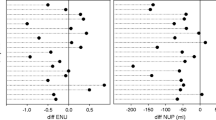Abstract
Introduction
This pre-specified sub-study of the desmopressin response in primary nocturnal enuresis study (DRIP study) evaluates the safety profile of the oral desmopressin tablet in children with primary nocturnal enuresis. Endpoints are adverse events and change in body mass index.
Methods
The DRIP study was an open-label, intention-to-treat, phase IV, multi-national study. Overall, 936 patients were screened and 744 children aged 5–15 years with previously untreated primary nocturnal enuresis were eligible to receive the study medication desmopressin once daily as an oral tablet formulation. At each visit, adverse events were questioned and observed signs or symptoms were recorded.
Results
Overall, 222 (30%) patients experienced 404 treatment-emergent adverse events. The proportion of patients experiencing treatment-emergent adverse events was similar regardless of patient gender or age. Most treatment-emergent adverse events were experienced in three system organ classes: gastrointestinal disorders; infections and infestations; and respiratory, thoracic and mediastinal disorders and were considered unrelated to the study drug. There was a slight increase in body mass index from screening levels during the study, however, clinically not significant.
Conclusion
Desmopressin tablet treatment is well tolerated in children with primary nocturnal enuresis, regardless of patient gender or age.
Funding
The desmopressin response in primary nocturnal enuresis study (DRIP- study) was funded by Ferring.

Similar content being viewed by others
References
Hjalmas K, Arnold T, Bower W, et al. Nocturnal enuresis: an international evidence based management strategy. J Urol. 2004;171(6 Pt 2):2545–61.
Neveus T, Eggert P, Evans J, et al. Evaluation of and treatment for monosymptomatic enuresis: a standardization document from the International Children’s Continence Society. J Urol. 2010;183(2):441–7.
Glazener CM, Evans JH, Peto RE. Alarm interventions for nocturnal enuresis in children. Cochrane Database Syst Rev. 2005;2:CD002911.
Neveus T, von Gontard A, Hoebeke P, et al. The standardization of terminology of lower urinary tract function in children and adolescents: report from the Standardisation Committee of the International Children’s Continence Society. J Urol. 2006;176(1):314–24.
Vande Walle J, Rittig S, Bauer S, et al. Practical consensus guidelines for the management of enuresis. Eur J Pediatr. 2012;171(6):971–83.
Glazener CM, Evans JH. Desmopressin for nocturnal enuresis in children. Cochrane Database Syst Rev. 2002;3:CD002112.
Djurhuus JC, Norgaard JP, Rittig S. Monosymptomatic bedwetting. Scand J Urol Nephrol Suppl. 1992;141:7–17 (discussion 8–9).
Van de Walle J, Van Herzeele C, Raes A. Is there still a role for desmopressin in children with primary monosymptomatic nocturnal enuresis?: a focus on safety issues. Drug Saf Int J Med Toxicol Drug Exp. 2010;33(4):261–71.
Robson WL, Leung AK, Norgaard JP. The comparative safety of oral versus intranasal desmopressin for the treatment of children with nocturnal enuresis. J Urol. 2007;178(1):24–30.
VandeWalle J, Stockner M, Raes A, Norgaard JP. Desmopressin 30 years in clinical use: a safety review. Curr Drug Saf. 2007;2(3):232–8.
Robson WL, Norgaard JP, Leung AK. Hyponatremia in patients with nocturnal enuresis treated with DDAVP. Eur J Pediatr. 1996;155(11):959–62.
Lucchini B, Simonetti GD, Ceschi A, et al. Severe signs of hyponatremia secondary to desmopressin treatment for enuresis: a systematic review. J Pediatr Urol. 2013;9(6 Pt B):1049–53.
Dehoorne JL, Raes AM, van Laecke E, Hoebeke P, Vande Walle JG. Desmopressin toxicity due to prolonged half-life in 18 patients with nocturnal enuresis. J Urol. 2006;176(2):754–7 (discussion 7–8).
De Guchtenaere A, Raes A, Vande Walle C, et al. Evidence of partial anti-enuretic response related to poor pharmacodynamic effects of desmopressin nasal spray. J Urol. 2009;181(1):302–9 (discussion 9).
Lottmann H, Baydala L, Eggert P, et al. Long-term desmopressin response in primary nocturnal enuresis: open-label, multinational study. Int J Clin Pract. 2009;63(1):35–45.
Van Herzeele C, Alova I, Evans J, et al. Poor compliance with primary nocturnal enuresis therapy may contribute to insufficient desmopressin response. J Urol. 2009;182(4 Suppl):2045–9.
Juul KV, Klein BM, Sandstrom R, Erichsen L, Norgaard JP. Gender difference in antidiuretic response to desmopressin. Am J Physiol Renal Physiol. 2011;300(5):F1116–22.
De Bruyne P, De Guchtenaere A, Van Herzeele C, et al. Pharmacokinetics of desmopressin administered as tablet and oral lyophilisate formulation in children with monosymptomatic nocturnal enuresis. Eur J Pediatr. 2014;173(2):223–8.
Acknowledgments
The desmopressin response in primary nocturnal enuresis study (DRIP study) was funded by Ferring. All authors had full access to all of the data in this study and take complete responsibility for the integrity of the data and accuracy of the data analysis. All named authors meet the ICMJE criteria for authorship for this manuscript, take responsibility for the integrity of the work as a whole, and have given final approval for the version to be published.
Conflict of interest
C. Van Herzeele, J. Evans and P. Eggert declare that they have no actual or potential conflict of interest. P. De Bruyne received an independent Grant for Strategic Basic Research of the Agency for Innovation by Science and Technology in Flanders (IWT). H. Lottmann is a lecturer and advisor for Ferring Pharmaceuticals. J. Norgaard is a full time employee of Ferring Pharmaceuticals. J. Vande Walle is a lecturer, investigator and advisor for Ferring Pharmaceuticals.
Compliance with ethics guidelines
All procedures followed were in accordance with the ethical standards of the responsible committee on human experimentation (institutional and national) and with the Helsinki declaration of 1975, as revised in 2000 and 2008. Informed consent was obtained from all patients before being included in the study.
Author information
Authors and Affiliations
Corresponding author
Additional information
Trial registration: Clinical Trials.gov Identifier: NCT00245479.
Electronic supplementary material
Below is the link to the electronic supplementary material.
Rights and permissions
About this article
Cite this article
Van Herzeele, C., De Bruyne, P., Evans, J. et al. Safety Profile of Desmopressin Tablet for Enuresis in a Prospective Study. Adv Ther 31, 1306–1316 (2014). https://doi.org/10.1007/s12325-014-0173-1
Received:
Published:
Issue Date:
DOI: https://doi.org/10.1007/s12325-014-0173-1




